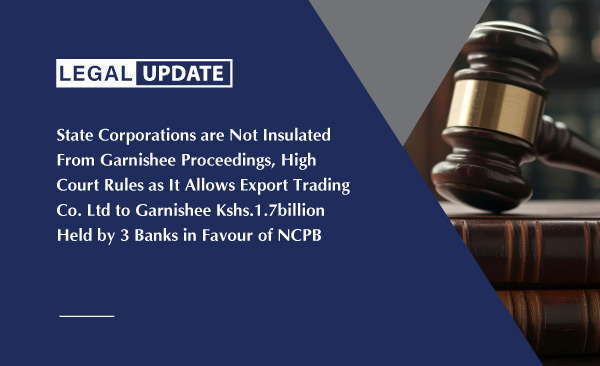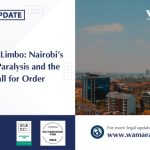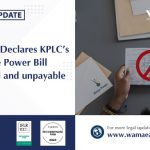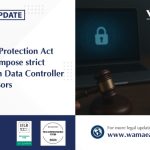- INTRODUCTION
The High Court has juridically pronounced itself that State Corporations are not insulated from garnishee proceedings. Justice Hon. P Mulwa while determining our client’s, Export Trading Company Limited, garnishee application, for the release Kshs.1,714,544,898.81 together interest at 12% p.a until payment in full has agreed with our cogent submissions that NCPB cannot be insulated from settling the decretal sum on the auspices of being a state corporation.
Facts preceding the Garnishee Application are that Export Trading Co. entered into a contract with NCPB for the Supply and Delivery of various types of Fertilizer. NCPB defaulted in settling the decretal amount. Export Trading Co. thereafter commenced arbitral proceedings wherein it was awarded the balance of the decretal sum. Under our client’s instructions, we commenced enforcement proceedings at the High Court and sought for payment by NCPB. Upon failure to settle the decretal sum, we proceeded to successfully file a garnishee application seeking Order absolute directing that 3 Garnishees banks to release in full monies held in favour of NCPB.
- WHY STATE CORPORATIONS ARE NOT INSULATED FROM GARNISHEE PROCEEDINGS
In considering our submissions, the Court took cognisance of the legal status of NCPB, which under Section 5 of the National Cereals and Produce Board, is a corporate with perpetual succession and a common seal, and has the following powers;
- The Board has the power to enter into contracts and arrangements; and
- To establish and operate in the name of the board any bank accounts in may deem necessary.
NCPB is an entity capable of subsisting independently from Government
The court therefore held that it would be untenable to invoke the Government Proceedings Act (Cap 40) as a bar to any execution proceedings. The court rightfully analysed that NCPB is a body corporate with perpetual succession and a common seal and as such, it is a corporate entity capable of subsisting independently. Furthermore, NCPB is dependant on Government funding but it is not government or servant of or agent of Government for the purposes of the Government Proceeding Act.
Is the Government Proceedings Act a shield by the State Corporation from execution proceedings?
Suffice to point out, NCPB is an independent judicial person capable of being sued and suing. Its litigation does not involve the Government; and thus, any Judgments decreed against the NCPB, are not Judgments against the government but against an independent juridical body.
Indeed, from arbitral proceedings NCPB had held itself as a body corporate and not its submissions that it is insulated under Government Proceedings Act did not find favour with the Court. Similar arguments had been raised by KICC in a garnishee application, and the Court dismissed the same in Greenstar Systems Limited v Kenyatta International Convention Centre (KICC) & 2 Others [2018] eKLR, wherein Odero J held that the entity had held itself out as a body corporate and not as a government department or agency. It was thus improper for KICC to invoke the Government Proceedings Act as such conduct was an attempt to scuttle the execution proceedings against it.
Does barring State Corporations from garnishee an impediment to the right to access to justice?
It is our considered view that the second main reason why garnishee proceedings ought to proceed against state corporations is that the Constitution grants all parties the right to access to justice and the fact that all persons are equal before the law and must be subjected to the rule of law. Therefore, a litigant is entitled to reap the fruits of his successful litigation. As a result, where a Judgment – Debtor fails to comply with the terms of a Judgment, the Judgment – Creditor is entitled to enforce such Judgment by adopting a suitable procedure provided under the law.
The above position was aptly enunciated by Hon. Mwita in Kenya National Highways Authority – Versus – Ahmednassir Maalim Abdullahi [2021]eKLR wherein he held that a successful litigant should not be barred from enjoying the fruits of litigation. Further, the Judge posited that the failure by The Judgement Debtor, in this case a state corporation, would seriously violate the Decree Holder’s right of access to justice thus Contra constitutionem.
In addition, Justice Prof. Sifuna in Milimani Commercial Case No. E411 of 2023 Absa Bank Kenya PLC Versus Kenya Deposit Insurance Corporation cast doubt on the legality and constitutionality of sections 13A and 21 of the Government Proceedings Act (Cap 40), which have traditionally required a litigant desirous of filing a suit against government or a government agency (including parastatals) to issue a 30 days’ notice before initiating such proceedings thus protecting Government from execution/attachment by a party.
A thought-provoking legal question on the discriminatory nature of 13A and 21 of the Government Proceedings Act
Upon conducting an in-depth analysis of sections 13A and 21 of the Government Proceedings Act we posit that the said sections are discriminatory to the extent that they confer preferential treatment on Government as a party in litigation, and to the detriment of its citizens who are not accorded the same privilege. Furthermore, section 22 of the Government Proceedings Act allows government to seek default judgement and execute against its citizens without the impediment of having to notify them beforehand, or seek leave of the court to do so, yet the same benefit is not accorded to citizen litigants. Indeed, in Japheth Nzila Muangi v Minister for Land & Environment of the County Government of MomFRbasa & another [2019] eKLR, Court held that although section 21 (4) forbids attachment of government property, it does not preclude the government from paying out monies.
Further, Mabeya A. in African Commuter Services Ltd v Kenya Civil Aviation Authority & 2 others [2014] eKLR, held that while it was in the public interest to safeguard the interests of the Respondent, the greater public interest required that the Applicant be allowed to enforce its rights and that all litigants be treated equally without exception. The Court was point blank in holding that all litigants be treated equally without exception and that there can be no special category of citizens or corporations who would operate outside the law.
In his dictum, Justice Mabeya was spot on in holding that the greater public interest requires that the litigant be allowed to enforce its rights and thereby maintain and sustain the Constitutional value and principle of governance of the rule of law than to uphold narrow interests of allowing a state and public corporation to prevaricate or suspend the rule of law by refusing to obey a court’s decision more so that of the Court of Appeal on the pretext of public interest.
- CONCLUSION
In view of the foregoing, it is our considered view that the Government is under a duty to obey the law and discharge all of its statutory and legal obligations and that the insulation and immunity granted to it were intended to protect the public interest as it is the same public who would ultimately be called upon to pay the colossal sums which may have accrued on the original decretal sum.
The decree holder’s right to enjoy fruits of his judgment must not be thwarted. When faced with such a scenario, the Court should adopt an interpretation that favours enforcement and as far as possible secures accrued rights. This is underpinned by the values of the Constitution particularized under Article 10, the obligation of the court to do justice to the parties and to do so without delay under Article 159(2)(a) and (b) and the applicant’s right of access to justice protected under Article 48 of the Constitution.
This article is provided free of charge for information purposes only; it does not constitute legal advice and should be relied on as such. No responsibility for the accuracy and/or correctness of the information and commentary as set in the article should be held without seeking specific legal advice on the subject matter. If you have any query regarding the same, please do not hesitate to contact Litigation Department at Litigation@wamaeallen.com
 Loading...
Loading...
About the author
Caxstone specializes in civil, employment and labour disputes, constitutional law, family law and succession, and environment and land matters. He has amassed a wealth of knowledge and experience in litigation which is evident in the successes obtained for clients. He is an active member of the Employment and Labour Relations Court Bar-Bench committee.
Denis Mutugi specializes in Commercial Litigation and Alternative Dispute Resolution.
Denis graduated with a Bachelor of Laws, LLB (Hons) from The University of Nairobi in 2021 and was admitted to the Roll of Advocates of the High Court of Kenya in the year 2023.
Denis has amassed a considerable wealth of experience in conducting legal research on various complex legal matters touching on Commercial, Insurance, Employment and Insolvency law and bankruptcy.
-
Denis Mutugihttps://wamaeallen.com/author/denis-mutugi/
-
Denis Mutugihttps://wamaeallen.com/author/denis-mutugi/
-
Denis Mutugihttps://wamaeallen.com/author/denis-mutugi/
-
Denis Mutugihttps://wamaeallen.com/author/denis-mutugi/












